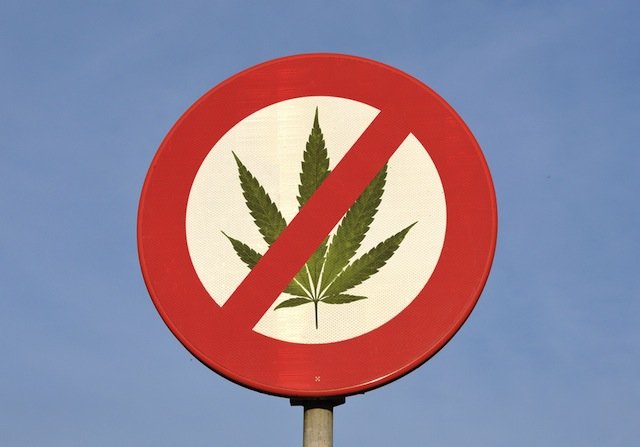
Increased restrictions and labeling of cannabis as a poison began in many states from 1906 onward, and outright prohibitions began in the 1920s. By the mid-1930s marijuana was regulated as a drug in every state, including 35 states that adopted the Uniform State Narcotic Drug Act. The first national regulation was the Marihuana Tax Act of 1937.
The use of cannabis and other drugs came under increasing scrutiny after the formation of the Federal Bureau of Narcotics in 1930, headed by Harry J. Anslinger as part of the government's broader push to outlaw all recreational drugs.
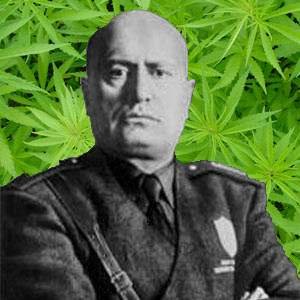
Anslinger claimed cannabis caused people to commit violent crimes and act irrationally and overly sexual. The FBN produced propaganda films promoting Anslinger's views and Anslinger often commented to the press regarding his views on marijuana.
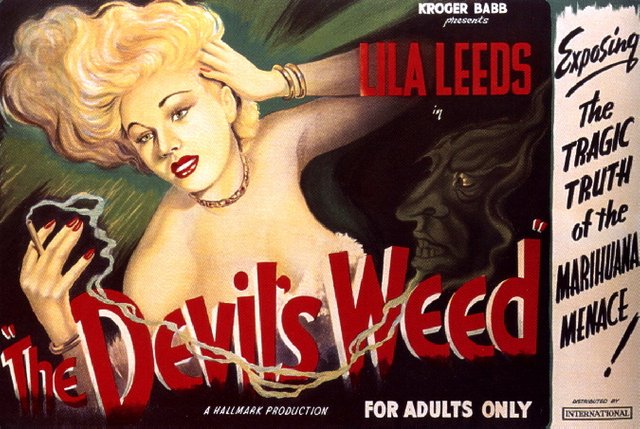
His view was clear, ideological and judgemental:
“By the tons it is coming into this country — the deadly, dreadful poison that racks and tears not only the body, but the very heart and soul of every human being who once becomes a slave to it in any of its cruel and devastating forms.... Marihuana is a short cut to the insane asylum. Smoke marihuana cigarettes for a month and what was once your brain will be nothing but a storehouse of horrid specters. Hasheesh makes a murderer who kills for the love of killing out of the mildest mannered man who ever laughed at the idea that any habit could ever get him....”
By using the mass media as his forum, Anslinger propelled the anti-marijuana sentiment from state level to a national movement. He used what he called his "Gore Files" - a collection of quotes from police reports - to graphically depict offenses caused by drug users. They were written in the terse and concise language of a police report.
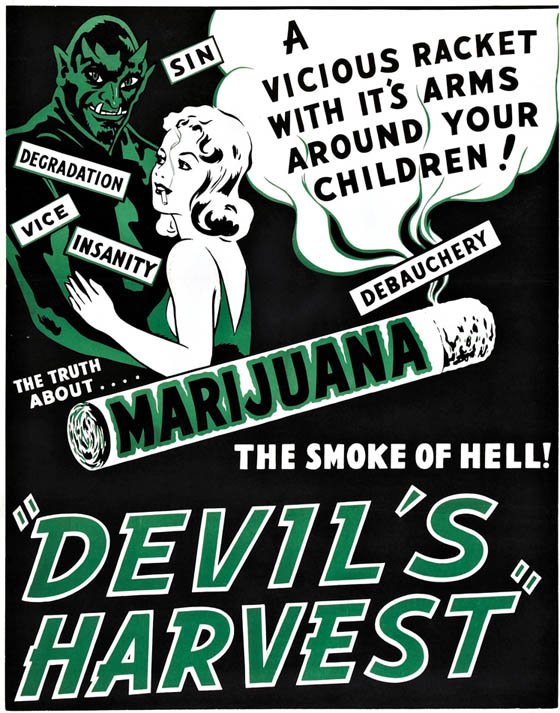
His most infamous story in the The American Magazine concerned Victor Licata who killed his family:
"An entire family was murdered by a youthful addict in Florida. When officers arrived at the home, they found the youth staggering about in a human slaughterhouse. With an axe he had killed his father, mother, two brothers, and a sister. He seemed to be in a daze... He had no recollection of having committed the multiple crimes. The officers knew him ordinarily as a sane, rather quiet young man; now he was pitifully crazed. They sought the reason. The boy said that he had been in the habit of smoking something which youthful friends called 'muggles,' a childish name for marijuana."
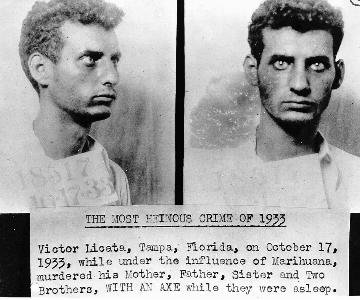
The story is one of 200 violent crimes that were documented in Anslinger's "Gore Files" series. However, it has since been proved that Licata never murdered his family because of cannabis use; the youth actually had a severe mental illness. Researchers have now proved that Anslinger wrongly attributed 198 of the "Gore Files" stories to marijuana usage and the remaining "two cases could not be disproved, because no records existed concerning the crimes."
In the 1930s Anslinger's articles often contained racial themes in his anti-marijuana campaign:
"Colored students at the Univ. of Minn. partying with white female students, smoking marijuana and getting their sympathy with stories of racial persecution. Result: pregnancy"
"Two Negros took a girl fourteen years old and kept her for two days under the influence of hemp. Upon recovery she was found to be suffering from syphilis."
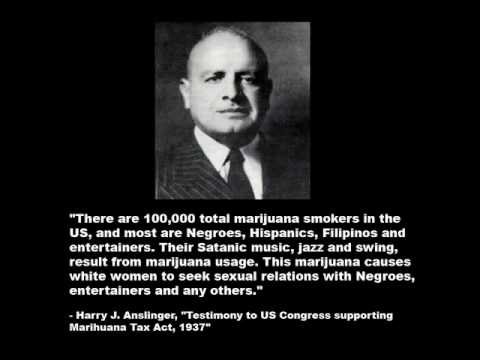
The Marihuana Tax Act of 1937 effectively made possession or transfer of marihuana illegal throughout the United States under federal law, excluding medical and industrial uses, through imposition of an excise tax on all sales of hemp.
The decision of the United States Congress to pass the Marihuana Tax Act of 1937 was based on poorly attended hearings and reports based on questionable studies. In 1936 the Federal Bureau of Narcotics noticed an increase of reports of people smoking marijuana, which further increased in 1937. The Bureau drafted a legislative plan for Congress seeking a new law, and the head of the FBN, Harry J. Anslinger, ran a campaign against marijuana. Newspaper mogul William Randolph Hearst's empire of newspapers used the "yellow journalism" pioneered by Hearst to demonize the cannabis plant and spread a public perception that there were connections between cannabis and violent crime.
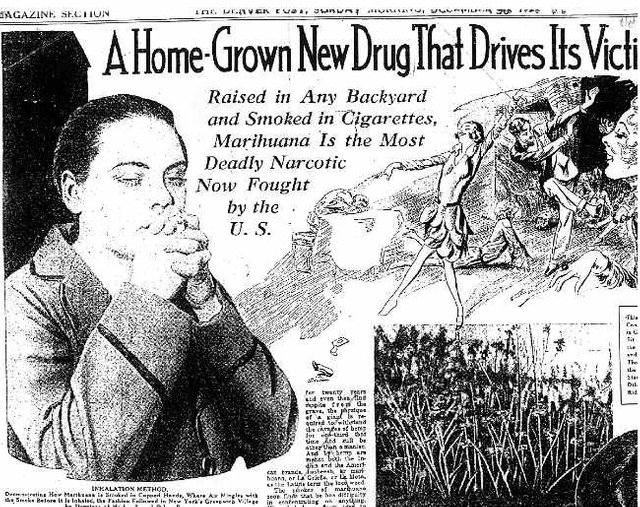
Several scholars argue that the goal was to destroy the hemp industry, largely as an effort of Hearst, Andrew Mellon and the Du Pont family. They argue that with the invention of the decorticator hemp became a very cheap substitute for the wood pulp that was used in the newspaper industry. However, Hearst newspapers owed large debts to Canadian suppliers of paper, who used wood as raw material. If an alternative raw material for paper had emerged, it would have lowered the price of the paper needed to print Hearst's many newspapers - a positive thing for Hearst.
Mellon was Secretary of the Treasury, as well as the wealthiest man in America, and had invested heavily in nylon, DuPont's new synthetic fiber. He considered nylon's success to depend on it replacing the traditional resource, hemp.

The La Guardia Committee, promoted in 1939 by New York Mayor Fiorello La Guardia, was the first in-depth study into the effects of smoking marijuana. It systematically contradicted claims made by the U.S. Treasury Department that smoking marijuana resulted in insanity, and determined that '"the practice of smoking marihuana does not lead to addiction in the medical sense of the word." Released in 1944, the report infuriated Anslinger and he condemned it as unscientific.
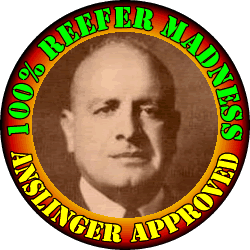
Prior to the end of alcohol prohibition, Anslinger had claimed that cannabis was not a problem, did not harm people, and “there is no more absurd fallacy” than the idea it makes people violent. His critics argue he shifted not due to objective evidence but due to the obsolescence of the Department of Prohibition he headed when alcohol prohibition ceased - seeking a new Prohibition. Of 30 leading scientists whose views he sought, 29 said cannabis did no harm. However, Anslinger chose to pursue only the views of the one who did.
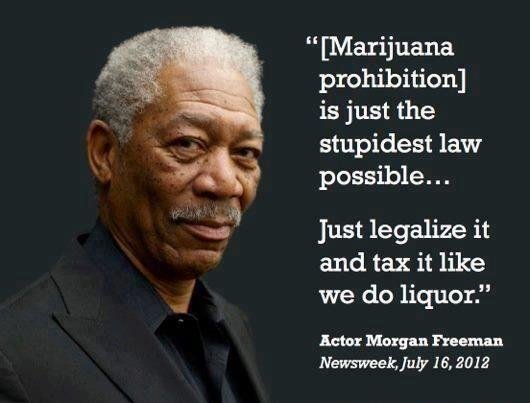
Legalize it!
Really nice post.Thanks to people like you and Morgan Freeman, it's only a matter of time till cannabis is legal in the hole world.
Downvoting a post can decrease pending rewards and make it less visible. Common reasons:
Submit